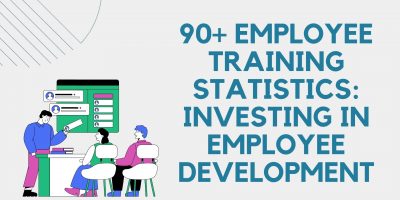
90+ Employee Training Statistics in 2025: Investing in Employee Development
Explore valuable employee training statistics that show the growing demand for work training and development.


Founder & Chief Digital Marketer of Parking Made Easy

Book Writing Coach

Founder & CEO of Insights Exchange

Head of People at PhotoAiD

CEO & Co-Founder at Passport Photo Online

CEO of Nova Custom Printing

CEO & Co-Founder of SaleHoo
There is an ongoing global debate about autonomous workers or the so-called gig economy. We’ve all heard freelancing is the latest buzzword among young entrepreneurs, so the question is, is gig work a huge opportunity, or is it a sneaky way to take advantage of workers by misclassifying them?
What is the gig economy?
And what does the gig economy offer to independent workers that traditional employment doesn’t?
This article aims to answer these questions with insightful perspectives from leading experts and paint a better picture of the future of work while highlighting some criticism and opportunities.
If you’ve ever used an app to get a freelance taxi driver, book a vacation rental, or purchase a homemade craft, you’ve already participated in the gig segment of the economy.
It’s become such an essential part of our lives that it’s hard to imagine life without it.
So, what is the gig economy?
You may have used the term “gigs” for musicians that would do one-off show performances. These days, the gig economy symbolizes an entire ecosystem of independent contractors, often called freelancers.
According to the IRS, the gig economy is an activity where people earn income by providing on-demand work, goods, or services. Typically, these activities are conducted through digital gig platforms, like an app or website.
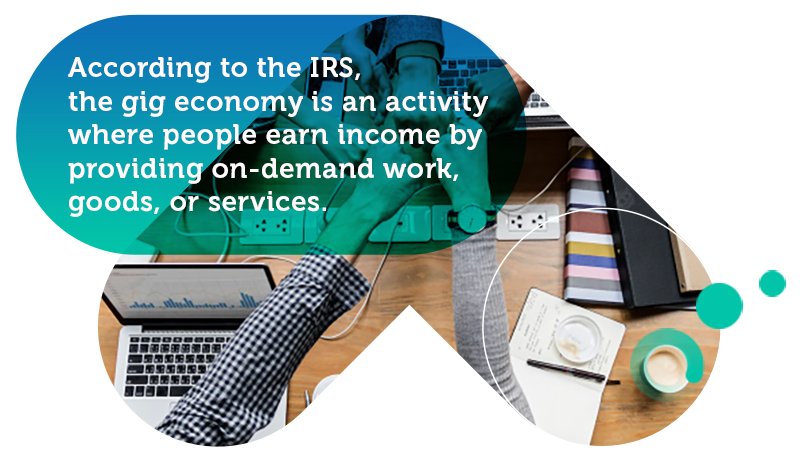
Broadly defined, gig work includes multiple kinds of alternative work arrangements, such as:
While flexible staffing has been a staple in the customer service industry, companies of all sectors today adopt these alternative work arrangements on a large scale. Gig employees could be writers, rideshare drivers, accountants, photographers, programmers, tutors, realtors, graphic designers, etc.
In short, anyone who enters into a contract with a company to provide services without being on the company’s payroll. Due to the influx of non-traditional employees, companies are adopting freelance management systems (FMS) to help maintain a large talent pipeline of freelancers run smoothly.
Undeniably, the gig economy offers a unique set of benefits and downsides that leaves many wondering if it will replace traditional jobs.
After explaining what gig work and freelancing are, you may wonder what is the opposite of gig economy. Workers with traditional employment arrangements are on the formal economy’s opposite end.
Workers with traditional work arrangements are employed by a company on a long-term, full-time basis to carry out their particular tasks. In return, employees earn stable pay and are entitled to additional benefits such as health insurance and leave days.
From an employer’s perspective, traditional employment arrangements may incur higher overhead costs as they have to provide:
Furthermore, employers need to be aware of motivating and engaging traditional employees as monotonous work can discourage creativity and enthusiasm.
On the other hand, gig workers tend to update their skills frequently and minimize the ramp-up time. Since gig workers are hired on a short-term basis, they bring innovation, fresh perspectives, and knowledge to the company – breaking the monotony.
In contrast to traditional employment, the benefits of flexible staffing became obvious when businesses were plunged into uncertainty during the COVID-19 pandemic.
Moreover, companies have adapted to severe global labor shortages and supply chain disruptions and recently implemented asset-sharing business models. As a result of this shifting business landscape, many U.S. businesses found themselves reliant on gig workers as part of their critical workforce.
Nichola Quail, Founder and CEO of Insights Exchange, shared their insights on this trend by stating, “We are strong believers in hiring freelancers and feel it is going to be a significant part of the future of work.
Companies are downsizing or have hiring freezes due to Covid, the market downturn, and needing to keep headcount low. It is the perfect opportunity to be a freelancer, but you need to be open to risk, have a community of support around you, and be open to the highs and lows.”
One universal human desire is finding a good and fulfilling job.
Depending on the person, this definition can have different interpretations. For some, it means being independent and enjoying more freedom. While for others, it signifies stability and building a traditional career path with high-quality work experiences.
However, there is a necessary distinction between workers whose preference is flexibility and those who pick up gig work out of necessity just to make ends meet.
Findings suggest that younger workers may be turning to alternative work arrangements out of necessity, while it’s a preference for older workers. In fact, 71% of those with traditional employment arrangements are more likely to say that they are doing their preferred type of work, compared to 64% of gig workers. Furthermore, workers who choose their working style report greater satisfaction than those forced by their circumstances.
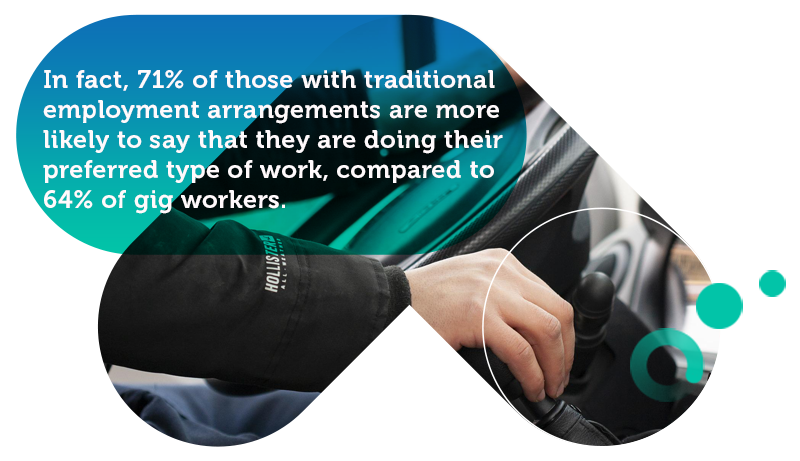
You might be wondering, who are these workers that participate in the gig work, and what does the gig economy offer to them? The independent workforce is very diverse because anyone can participate regardless of age, education, or industry.
The statistics point out that almost 36% of all U.S. workers participate in the gig economy in some capacity. As if that’s not enough, another estimate suggests that by 2027, the alternative workforce is expected to become the majority of the U.S. workforce.
Research shows that men are more likely than women to participate in the gig economy – 29% of men and 19% of women work in non-traditional forms of employment full-time. Gig work may be particularly beneficial for workers that normally would be excluded from the traditional workforce, like working mothers.
Surprisingly, Baby Boomers participate in the gig economy at higher rates than younger workers. This discovery may result from older workers transitioning into more flexible arrangements during retirement to supplement fixed incomes.
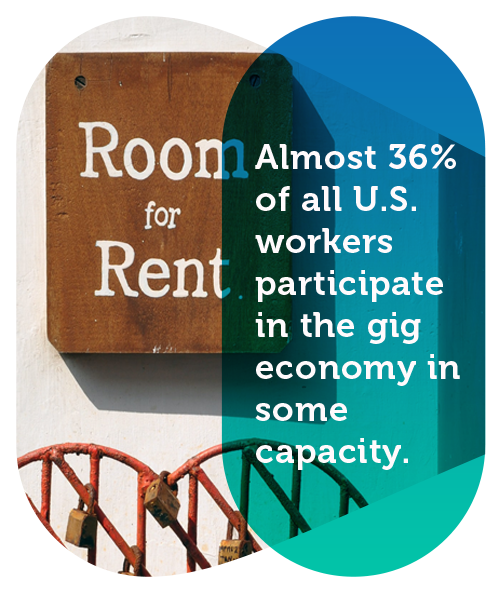
What does the gig economy offer that motivates workers to leave traditional employment? In other words, what’s so special about this industry, and why are people so drawn to it?
The gig’s work appeal is due to its two major features – flexibility and autonomy. Professionals worldwide continue to ditch traditional nine to five jobs in favor of the freedom freelancing provides.
With gig work, individuals can choose when they work according to their own schedule, with whom they work, and where they work, as there are no geographic constraints. In short, they get to be their own boss. As a result, they enjoy greater freedom and improved work-life balance.
As book writing coach Joanne Martin outlines, “I love the gig economy because it offers freedom and flexibility in relation to work. You’re not tied down to a standard 9-5 role, where you need permission to take leave and have to negotiate the hours you work in an office etc. Freelancing allows you to forge your own path, work as little or as often as you like and take holidays when it suits you, not your employer.”
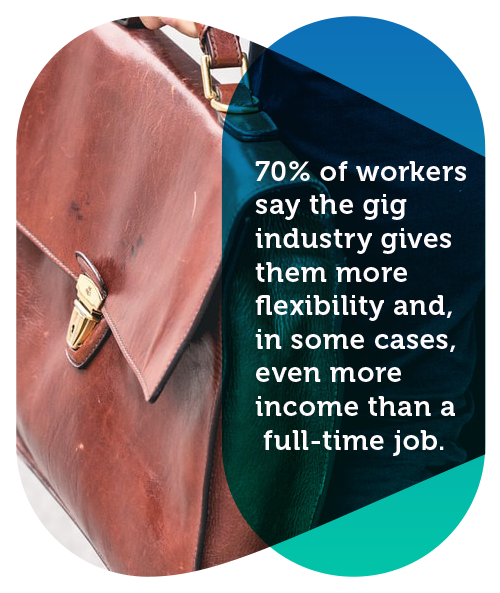
However, conventional wisdom suggests that all workers are motivated by monetary factors, and freelancing unlocks a practically unlimited earning potential.
According to a study by McKinsey, 70% of workers say the gig industry gives them more flexibility and, in some cases, even more income than a full-time job.
From Parking Made Easy, Daniel Battaglia comments, “I hired freelancers for ten years for their flexibility specialist skills and contract rates. It’s hugely beneficial, and I have now decided to become a freelancer to boost my income.”
Although for most gig workers, freelancing is simply a way to earn from multiple income streams and does not substitute their primary income. One significant disadvantage is that gig workers do not have a steady or consistent pay flow.
On the one hand, there’s a clear advantage that companies looking for talent can respond to the fast-paced and competitive marketplace needs. They can rely on non-traditional workers to quickly increase or decrease their workforce to match market or client demands.
While hiring temporary, seasonal workers is a well-established recruitment trend, more complex and highly-skilled roles are outsourced today.
From hospitals and healthcare workers – to IT professionals and programmers, using alternative workers helps mitigate the costs of high turnover and employee absenteeism.
Additionally, companies can avoid making a bad hire by using the project work as a way to test out new talent.
Simon Slade, CEO and co-founder of SaleHoo, highlighted this in their response by saying, “One of the advantages of hiring a freelancer is that it’s less daunting than hiring someone for a permanent position.
If the freelancer is difficult to work with, the relationship is over at the end of the project anyway. But with a permanent position, the commitment is ongoing. In most cases, the freelancers we’ve hired have provided exceptional results, and consequently, we’ve retained some freelancers to continue working on an ongoing basis.”
From PhotoAiD Maciej Kubiak reflected on the opportunity hiring freelancers presents by sharing, “My experience with freelancers is that hiring them can sometimes lead to a job interview you actually look forward to. If you’re pleased with their work, you may have just found exactly the type of employee you were looking for.”
Another benefit that Simon Slade brought up is that freelancers are especially beneficial for startups or small businesses that may not be able to afford to hire niche experts full-time.
Simon shared their experience with hiring experts on-demand, “As co-founder of three companies, I’ve used freelancers a lot over the years, especially in the early stages of building my companies.
We engage them on projects and tasks where we can’t justify full-time employment because the work might be limited to 5-15 hours a week or when we require expertise that is difficult to hire for quickly. These include media relations, product improvements, copywriting and video creation, for example”.
Not all gig workers are equal.
Within the gig economy, there is a thin line between those who voluntarily work as independent contractors and those who are taken advantage of by simply labeling them as contractors.
Most often, these are the most vulnerable people in our economy.
For generations before, workers fought for their legal rights, sick leave, holiday pay, the right to a minimum wage, and other social protections.
Yet, these fundamental rights are brushed off on the promise of freedom and flexibility in the gig industry. Legal challenges surrounding worker classification in the U.S. are complex and evolving, and misclassifying workers can result in hefty financial consequences.
Michael Nova, CEO of Nova Custom Printing, says that he’s seen both sides of the gig economy as he has hired freelancers and gained work as a freelancer.
Regarding the best and the worst thing about the gig economy, Michael states, “I would say the best thing is that it allows people to quickly get started and get clients almost immediately.
The worst thing about the gig economy is, obviously, that anyone can do it, whether they are qualified or not. Just hanging up a shingle saying that “I am an expert” is common practice these days, even though many people are far from being experts and fall short of their claims.
Again though, I do have to say that there are exceptions. It takes work to find the right people to work with, but it’s worth it in the end. I now have people that I can turn to and rely on to do a great job when I call on them, and that feeling can’t be beat. It makes it worth all the while and all the time and money spent beforehand to find them.”
Maciej Kubiak shared that one of the worst things about working with freelancers is that it is similar to a gamble. They commented,

Maciej Kubiak shared that one of the worst things about working with freelancers is that it is similar to a gamble. They commented, “For every good freelancer with an admirable work ethic, there’s another who might struggle with deadlines, can be hard to communicate with, or just isn’t good enough.”
This implies that team leaders and managers are responsible for managing and communicating expectations, values, and work culture, as alternative workers have no relationships within an organization.
Passport Photo Online’s CEO & Co-founder, Rafal Mlozki, offers strategies on how to optimize working with freelancers.
Leaders who rely on a gig talent pool must consistently “check the pulse” of their traditional employees and alternative workers to ensure team cohesion and productivity.
The business case for “what does the gig economy offer” is clear.
What once was considered unconventional work has become mainstream and possibly the future of work.
The vast number of skilled professionals turning to non-traditional work arrangements is a testament to the new relationship workers want to have with their workplace. As such, organizations that strategically utilize the alternative workforce stand to gain a significant competitive advantage in our rapidly-changing world.
Senior Content Writer at Shortlister
Browse our curated list of vendors to find the best solution for your needs.
Subscribe to our newsletter for the latest trends, expert tips, and workplace insights!

Explore valuable employee training statistics that show the growing demand for work training and development.
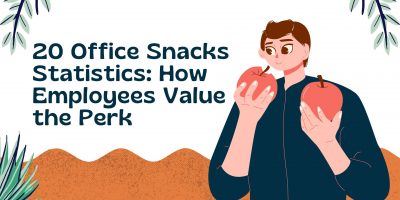
Enhance your office snack offerings using insights from the statistics, creating a more satisfying and productive work environment.

Understand the significance of maintaining a healthy work-life balance for overall well-being and long-term professional success.

From the first day of work until the employee leaves the company – creating good relations lasts for the entire employee journey, leading to healthy workplace relations.
Used by most of the top employee benefits consultants in the US, Shortlister is where you can find, research and select HR and benefits vendors for your clients.
Shortlister helps you reach your ideal prospects. Claim your free account to control your message and receive employer, consultant and health plan leads.